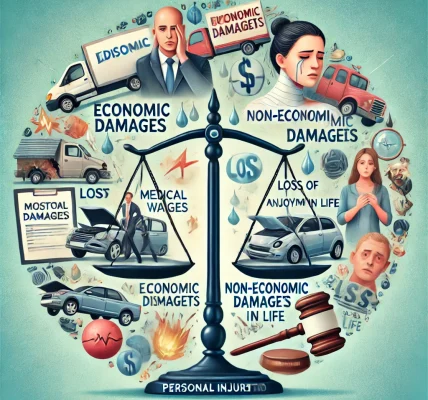When people think of personal injury cases, they often focus on medical expenses as the primary financial burden. However, the reality is that the true cost of a personal injury goes far beyond just hospital bills. From lost wages to emotional trauma, injuries can impact nearly every aspect of your life.
If you or a loved one has been injured due to someone else’s negligence, understanding the full extent of your damages is crucial. In this article, we’ll explore the hidden costs of a personal injury, how they affect victims, and what compensation you may be entitled to recover.
1. Medical Expenses: Just the Beginning
Medical bills are often the most obvious cost after an accident, but they don’t tell the whole story. While emergency room visits, surgeries, and medications are significant expenses, there are many other medical-related costs that victims may not anticipate, such as:
Ongoing and Future Medical Costs
- Physical therapy and rehabilitation for long-term recovery
- Follow-up doctor visits to monitor healing progress
- Medical devices and equipment (e.g., crutches, wheelchairs, prosthetics)
- Home modifications (e.g., ramps, stairlifts) for disability-related injuries
- Long-term care or assisted living for severe injuries
Many personal injury victims underestimate the long-term financial impact of their medical treatment. This is why it is essential to seek compensation that accounts for both current and future medical expenses.
2. Lost Wages and Loss of Earning Capacity
One of the most significant financial setbacks of a personal injury is lost income due to time off work. The more severe the injury, the longer the recovery, which can result in weeks, months, or even years of lost earnings.
How Lost Wages Are Calculated:
- Days, weeks, or months missed from work
- Reduction in work hours due to injury
- Missed opportunities for promotions or bonuses
For more severe injuries, victims may suffer from permanent disabilities that prevent them from ever returning to their previous job. In these cases, they may be entitled to loss of earning capacity—compensation for their inability to work in the future due to their injuries.
3. Pain and Suffering: The Emotional Toll
Unlike medical bills and lost wages, pain and suffering is not a direct financial cost but is still a critical aspect of a personal injury claim. Pain and suffering can include:
- Physical pain and discomfort from the injury itself
- Emotional distress, such as anxiety, depression, or PTSD
- Loss of enjoyment of life, particularly if the victim can no longer engage in activities they once loved
- Disfigurement or scarring, which can impact self-esteem and quality of life
These damages are harder to quantify than medical bills, but they are just as important in determining the full cost of a personal injury.
4. Property Damage and Other Financial Losses
Many personal injury cases involve damage to personal property, especially in cases involving car accidents, workplace injuries, or defective products. Victims may need to pay for:
- Vehicle repairs or replacement (for car accident cases)
- Damaged personal belongings (e.g., phones, clothing, electronics)
- Additional out-of-pocket expenses, such as rental cars or home services due to physical limitations
5. Impact on Personal Relationships (Loss of Consortium)
Personal injuries don’t just affect victims—they impact their families and relationships as well. Loss of consortium refers to the negative effects that an injury can have on a victim’s relationships with their spouse, children, or loved ones.
Some examples of how injuries can strain relationships include:
- Reduced companionship due to physical or emotional distress
- Struggles with intimacy in marital relationships
- Increased stress and burden on caregivers
In certain cases, spouses of injury victims may be able to seek compensation for the loss of companionship and support.
6. Long-Term Disability and Lifestyle Changes
For those with severe injuries, the financial burden extends far beyond the initial recovery period. Some victims may experience permanent disabilities that require them to make drastic life changes, such as:
- Relocating to an accessible home due to mobility impairments
- Hiring in-home caregivers for daily assistance
- Switching careers due to physical limitations
These lifestyle adjustments come with significant financial and emotional costs, making it crucial to account for them when seeking compensation.
7. Legal Fees and Court Costs
Pursuing a personal injury claim also comes with legal expenses. While many personal injury attorneys work on a contingency fee basis (meaning they only get paid if you win your case), there are still court fees, expert witness costs, and other legal expenses that must be covered.
Having a skilled personal injury attorney can help maximize compensation to cover these costs while ensuring you receive fair compensation for your suffering.
8. The Hidden Cost: Mental Health Effects
Beyond physical pain, personal injuries can take a toll on mental health. Many victims experience:
- Post-Traumatic Stress Disorder (PTSD)
- Chronic anxiety or depression
- Sleep disturbances
- Emotional trauma from the accident
Therapy, counseling, and mental health treatments are often necessary but expensive. These costs should be factored into any settlement or compensation claim.
Conclusion: Why You Need to Seek Full Compensation
A personal injury is more than just a physical wound—it can affect every aspect of your life, from your finances and career to your mental health and relationships. When filing a personal injury claim, it’s critical to consider all potential damages, not just medical bills.
If you or a loved one has been injured, working with an experienced personal injury attorney can help ensure that you receive full and fair compensation. By understanding the true cost of a personal injury, you can take the necessary steps to protect yourself and secure the financial support you need for a full recovery.
Don’t settle for less than you deserve—know your rights and fight for the compensation you need to move forward.




